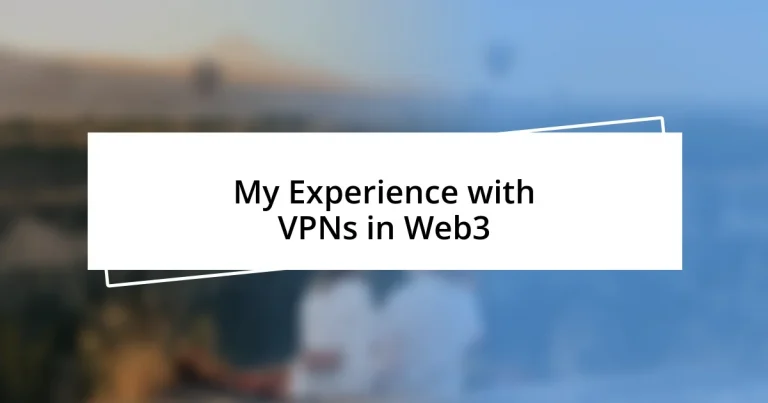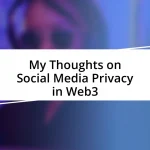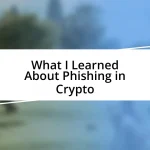Key takeaways:
- VPNs enhance online security and privacy in Web3, protecting user data and browsing habits from potential threats and snoopers.
- They enable access to restricted decentralized applications by bypassing geo-blocks, promoting digital freedom and exploration.
- Using a VPN provides a sense of safety, especially on public networks, while engaging with sensitive discussions or accessing financial platforms.
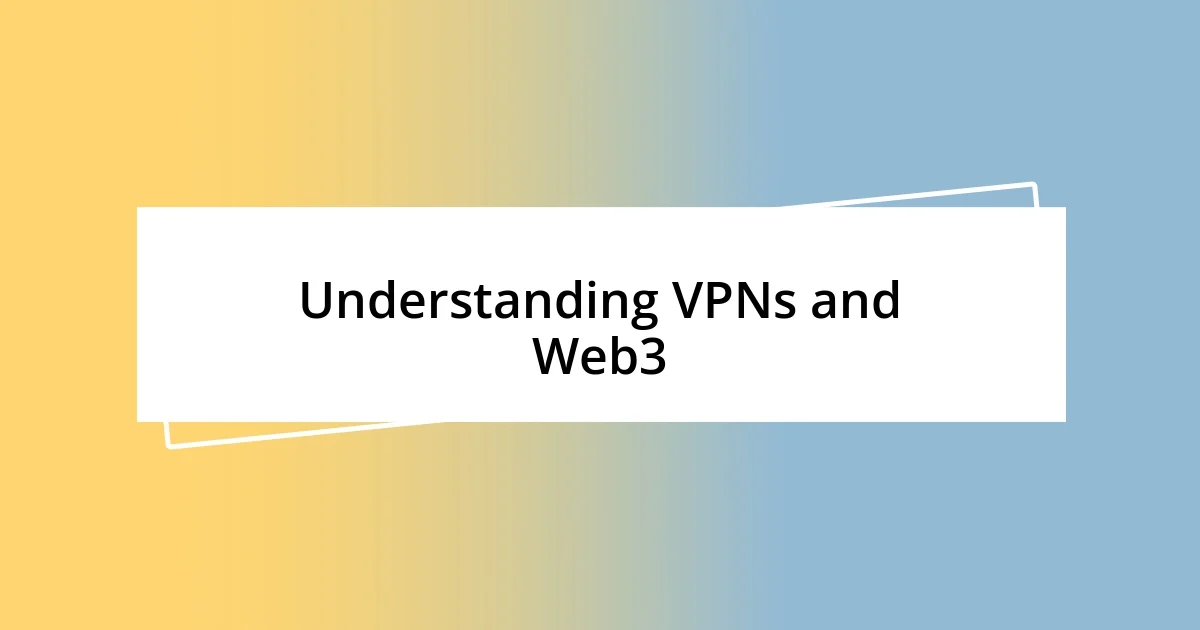
Understanding VPNs and Web3
VPNs, or Virtual Private Networks, play a crucial role in the world of Web3 by ensuring that users can navigate decentralized platforms securely. I remember my first experience setting up a VPN; it felt a bit daunting at first. I couldn’t help but wonder, “How does this little software shield my online presence?” Learning about encryption and how it masks my IP address opened my eyes to the layers of protection I now have while exploring the metaverse.
In the Web3 landscape, where privacy and data ownership are paramount, using a VPN enhances that security, offering peace of mind. I often think about how many times I’ve browsed through crypto forums or NFT platforms without a second thought. Suddenly, using a VPN felt like locking my personal data in a vault – a small but vital step in asserting control over my online identity.
Moreover, with Web3’s emphasis on decentralization, VPNs become a tool for resisting censorship and maintaining access to information. The first time I encountered a geo-blocked service, I felt frustrated, as if a door was slammed in my face. But once I connected to my VPN, it was like having my key back, allowing me to fully engage with the platforms and communities that matter to me. Isn’t it empowering to think that with just a few clicks, we can reclaim our digital freedom?
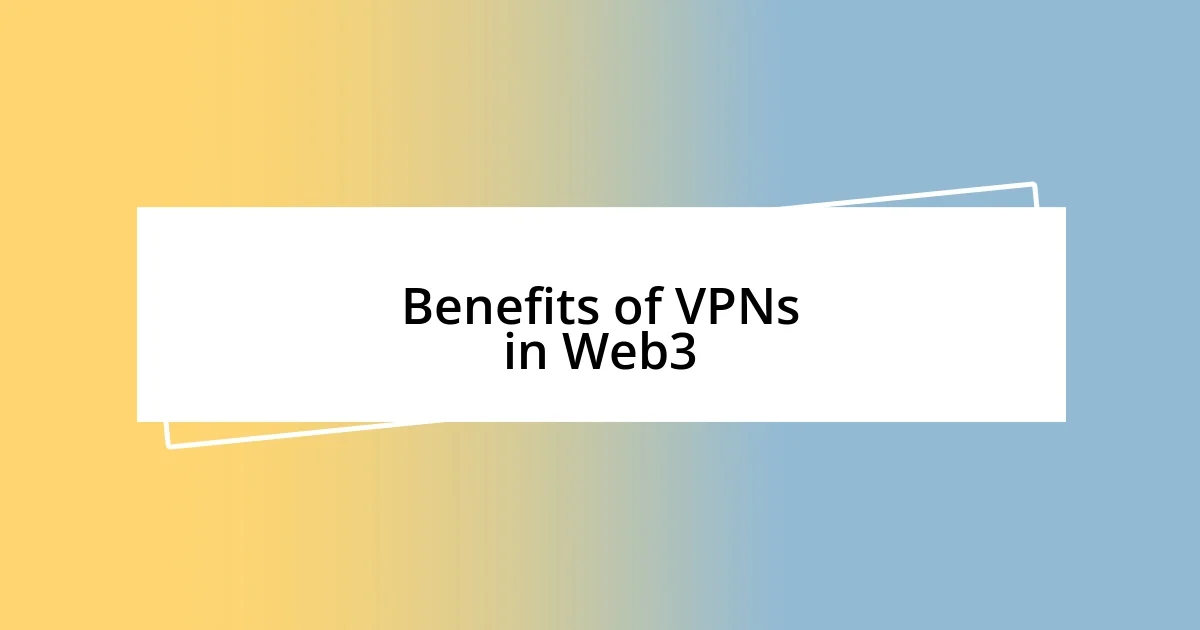
Benefits of VPNs in Web3
When I consider the benefits of VPNs in the Web3 space, one thing that stands out is the enhanced privacy they offer. Using a VPN not only shields my browsing habits but also makes me feel like I have a robust barrier between my personal data and potential snoopers. It’s reassuring, especially when I participate in online discussions about crypto investments, where sensitive information can be at stake. The first time I realized my IP address was hidden, it felt like unveiling a layer of my digital existence I didn’t even know could be so vulnerable.
Another significant advantage is protection from malicious attacks. During my early days in Web3, I encountered sketchy websites that made my gut churn. Once I started using a VPN, the level of anxiety I felt dropped considerably. I was no longer just a target with my unsecured connection; instead, I felt wrapped up in an extra layer of security. It’s amazing how a simple tool can transform your online experience from feeling exposed to being securely tucked away.
Lastly, VPNs can help optimize access to Web3 services that might otherwise be restricted due to regional limitations. I remember trying to access a popular decentralized application that was blocked in my country. What a frustration! But connecting to a VPN turned that frustration into excitement. I effortlessly bypassed barriers, opening up a world of possibilities that I was previously denied. Isn’t it incredible how technology can grant us access to global communities, bridging gaps that once felt insurmountable?
| Benefit | Description |
|---|---|
| Enhanced Privacy | Masks IP address and secures personal data while browsing. |
| Protection from Attacks | Reduces the risk of hacking and data theft on unsecured networks. |
| Access to Restricted Services | Bypasses geo-blocks and enables access to decentralized applications. |
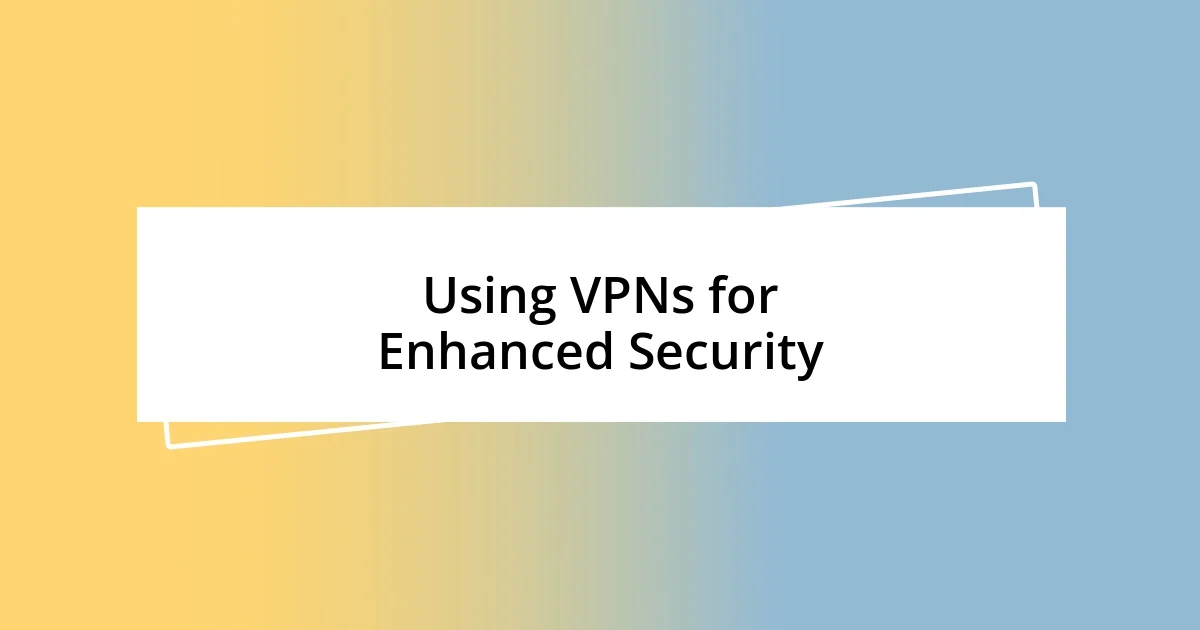
Using VPNs for Enhanced Security
Using a VPN for enhanced security in Web3 goes beyond just privacy; it’s a shield that guards against the uncertainties of the online world. I remember participating in a live discussion about blockchain technology when suddenly, it hit me: what if someone was tracking my digital footprint? It was in that moment I understood how vital it was to use a VPN; it made me feel invulnerable, like wearing an invisible armor while engaging in conversations that could potentially be under the radar.
One particularly eye-opening experience was while I was exploring DeFi platforms. I stumbled upon a warning about the increasing threats from unprotected networks. It sent a chill down my spine thinking how easily hackers could intercept my activities. But knowing that my VPN encrypted my data offered a reassuring sense of control. I often find myself asking, how many others are navigating these deep waters without proper protection? The thought motivates me to continually emphasize the necessity of VPNs for anyone venturing into such spaces.
Moreover, when I think about the importance of avoiding unwanted surveillance, I can’t help but recall a moment when I realized just how exposed I could be while using public Wi-Fi. The rush of connecting to a café’s hotspot felt exhilarating, but the nagging worry about potential data snoopers put a damper on my excitement. It’s astonishing how quickly I learned that a reliable VPN could effortlessly mask my activity. After that, using public networks became less of a gamble and more of a safely orchestrated experience. Don’t you wish everyone could enjoy that level of peace while browsing?












